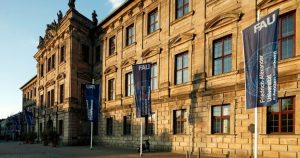Research and Teaching Unit for School Education and Instructional Research at the Friedrich-Alexander-University of Erlangen–Nuremberg (FAU), Germany
In the first year of the INSHIP project, the FAU team (Prof. Dr. Michaela Gläser-Zikuda, Dr. Florian Hofmann, Lisa Pösse) focused on an international literature review of teacher education and existing models of internship in teacher training. In a second step, the team analysed the models of internship in teacher education in Germany for a case study. There is great variation of teacher education programs in Germany (in 16 different states) due to the decentralized structure of educational policy. General aims and features of teacher education are determined by the Standing Conference of the Ministers of Education and Cultural Affairs (KMK). Teacher education programs of all 16 federal states in Germany are divided into two phases – a first one for university studies including several periods of internship and training in schools. The second phase of teacher education takes place in schools and teacher training colleges.

To describe the structure of teacher education in more detail, the FAU team presented the teacher education programs of the federal states of Bavaria and Thuringia as examples of two different models for integrating teaching practice into the first phase of teacher education. Within the traditional Bavarian model, student teachers have to complete two shorter periods of practical training in a school setting. Teacher training in Thuringia includes an integrated semester of field experience in school. During this semester, student teachers participate in all parts of school life. The teacher education programs of most of the German federal states are similar to one of these two models.
In a third step, the German case study was enriched by empirical data according to the principles of a SWOT analysis. In order to gain a detailed overview of the strengths, weaknesses, opportunities, and threats of the practical phases in teacher education, various stakeholders involved in the organization of teaching practice at the FAU were interviewed based on a semi-structured interview (academic staff N = 9; 7 female, mentors in schools N = 7; 5 female, student teachers N = 17; 10 female).
A snapshot of the main results illustrates that practical phases are seen as a very important part of teacher education by most of the stakeholders. It also became clear that good communication between stakeholders, criteria shared by all, a trustful relationship between mentor and student teachers, the teaching qualifications of the mentor teachers, and a constructive feedback culture are decisive factors in achieving the educational goals associated with the practical phases.
In the context of the INSHIP project, the FAU team also developed a first draft for a curriculum. The suggested program comprises one semester at university. During this practical semester, the student teachers should have the opportunity to observe and participate in all instruction related, and general school activities. They should be encouraged and supports to plan, implement, analyse, and reflect themselves and with the mentor, as well as other student teachers on classroom teaching. They should also participate in teacher conferences and further working groups at school. To support student teachers’ professionalization, core elements of the theoretical parts and practical experiences during the practical semester should be documented and systematically reflected in an e-portfolio. The FAU team has great experience with portfolio in learning, instruction, and teacher education.

